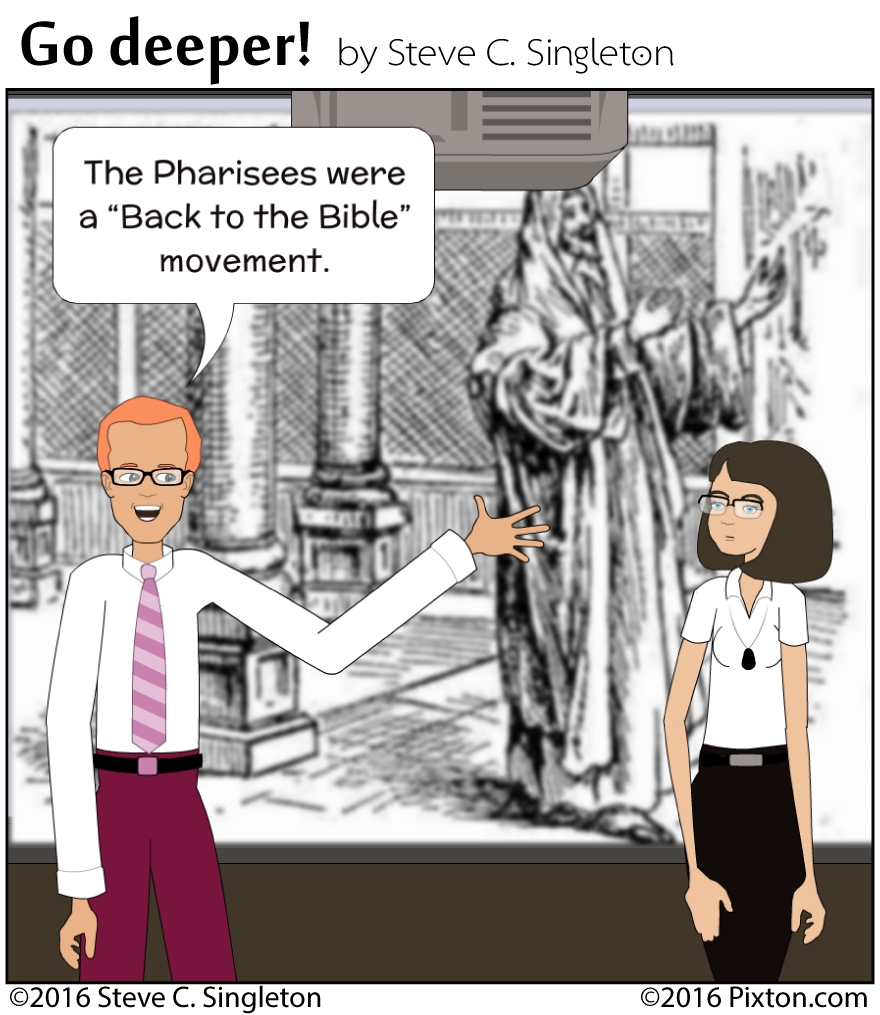The heart of the matter: A matter of the heart
1. Why does Jesus rebuke the Pharisees?
Jesus had run-ins with the Pharisees again and again. His problem with them had little or nothing to do with their doctrine, for he told everyone that they have the authority to speak for Moses (Matthew 23:2). In the next verse he went further: “You must be careful to do everything they tell you” (Matthew 23:3).
The Pharisees apparently had as their goal the restoration of Judaism back to a right relationship with God through careful obedience to the law. According to the Mishnah, they saw as their mission in life to “make a fence for the Torah” (Mishnah Abot 1:1). In other words, they believed they had the obligation to create traditions that would serve as a barrier preventing people from breaking God’s requirements.
Jesus did not necessarily object to such barriers, unless they became so important that they competed with God’s Word (Matthew 15: 3-9), or else became such a heavy burden that it discouraged people from even trying to obey God (Matthew 23:4, 13). In Jesus’ view, their twisted priorities caused them to focus on trivialities while neglecting matters crucial to God.
The Pharisees believed that if they could carefully control people’s conduct, right habits would create a right relationship with God. In other words, they were tackling the problem of sin from the starting point of behavior, perhaps eventually progressing to matters of the heart. As his Sermon on the Mount makes clear, Jesus proposed a different approach: we must begin with the heart, and once it is devoted to God, right behavior will follow. The heart of the matter, according to Jesus, is a matter of the heart.
2. A glance at Christendom
Modern religious movements, with goals similar to that of the Pharisees—to restore God’s true religion—often experience similar outcomes. A clarion call to restore primitive Christianity often focuses on the externals: name, governing body, acts of worship, proper steps in responding to the gospel, etc. But do heart-issues—justice, mercy, and faithfulness—get the focus they deserve as “the more important matters” (Matthew 23:23)?
Restorationist churches (and the variety of them may be greater than you imagine, including major denominations, cults, sects, and many non-denominational churches) seem to share a formulaic method of proselytizing. It involves listing a number of bullet points that describe the resemblance between the first-century church and their organization.
Of course, the list is selective, conveniently stressing points of greatest resemblance and omitting features of the primitive church that are rare or nonexistent in the group today. The list also tends to consist primarily of external things; matters of the heart, such as personal sacrifice, hospitality, generosity, spontaneous evangelism, and courageous suffering for Christ, seldom make the list.
3. Getting our priorities straight
Do not misunderstand. I am not advocating that we abandon the restoration plea. I am only concerned that we do not follow in the footsteps of the Pharisees who became experts at defining what was and was not work but were novices at serving anyone in need.
Twice in Matthew’s account of the gospel (Matthew 9:13 and Matthew 12:7), Jesus quotes Hosea 6:6: “I desire mercy, not sacrifice.” Taking this verse as a context marker and examining the entire chapter, we discover the prophets call to repentance in Hosea 6:1, 3:
Come, let us return to the Lord.
He has torn us to pieces but he will heal us;
he has injured us but he will bind up our wounds….
Let us acknowledge the Lord;
let us press on to acknowledge him….
Then, in Hosea 6:4, we hear God’s complaint:
“What can I do with you, Ephraim?
What can I do with you, Judah?
Your love is like the morning mist,
like the early dew that disappears.”
Next is God’s punishment for this sin (Hosea 6:5): “therefore I cut you in pieces with my prophets….” And the reason for this punishment is the nation’s hypocritical focus on the externals while neglecting matters of the heart (Hosea 6:6):
“For I desire mercy, not sacrifice,
and acknowledgment of God rather than burnt offerings.”
It is plain that God desires the same thing today.
Want to go deeper?
 Celebrate with you the first anniversary of the Facebook Friday cartoon, “Go deeper!” by Steve C. Singleton. Go Deeper – Volume One includes all of the cartoons in the first year (May 2015 to May 2016), along with dozens of accompanying essays, mainly on how to study the Bible. 278 pages, size 7-½” x 10-½” for only $4.95! Learn more >>, including 25 sample pages.
Celebrate with you the first anniversary of the Facebook Friday cartoon, “Go deeper!” by Steve C. Singleton. Go Deeper – Volume One includes all of the cartoons in the first year (May 2015 to May 2016), along with dozens of accompanying essays, mainly on how to study the Bible. 278 pages, size 7-½” x 10-½” for only $4.95! Learn more >>, including 25 sample pages.





